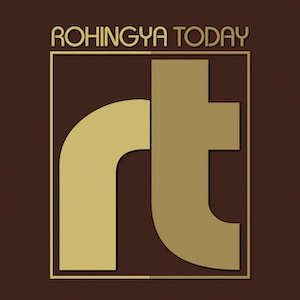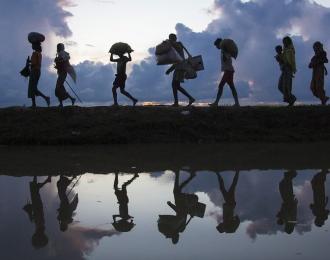
Thomson Reuters Foundation
COX'S BAZAR, Bangladesh -- In hotels and restaurants near the beach at Cox's Bazar in southeast Bangladesh, international and local aid workers sent to help the Rohingya in the world's largest refugee settlement talk nervously of the major challenge ahead - the weather.
Cox's Bazar was mainly known as Bangladesh's top local tourism spot, famed for the world's longest natural sea beach, until the 2017 arrival of more than 730,000 Rohingya fleeing persecution in Myanmar in a human exodus of unprecedented scale.
Joining thousands of Rohingya Muslims already in Cox's Bazar, they cleared forests and built shelters from mud and bamboo to create a sprawling mass of camps that now house more than 900,000 people, of which 80 percent are women and children.
Over 18 months the Bangladesh government, with thousands of staff from about 145 non-government organisations (NGOs) and aid agencies, have brought order to the chaos, building more stable shelters, roads, sanitation and setting up community projects.
But while life in the settlement has started to stabilise, aid workers said they were rushing to secure the camps for the longer term with no sign of the crisis ending and one factor hanging over them - the monsoon in May then cyclone season.
"This is not an easy place to work because we are constantly worrying about things over which we have no control," said Nayana Bose, spokeswoman for the Inter Sector Coordination Group (ISCG) that coordinates the humanitarian agencies' work.
"It's challenging in terms of terrain, weather, and population," she said, adding this made it harder than other refugee crises and Bangladesh's biggest ever humanitarian task.
Aid workers recalled how the early months of the crisis were focused on life-saving work, such as building shelters and latrines, food supplies, and dealing with health emergencies.
They worked around the clock in the camps located about 40 km (25 miles) south of Cox's Bazar – a 1.5 hour drive that can take much longer depending on traffic on the pot-holed roads where aid agencies' four-wheel drives vie with auto rickshaws.
FLY IN, FLY OUT
Most international staff came for three month stints but as time went on were replaced by staff on six month and one year contracts, working eight week shifts before flying out for one week of rest and recreation and to visit their families.
Leisure activities are limited in Cox's Bazar, with alcohol in Muslim Bangladesh only available at some international hotels, so some aid staff set up yoga classes and book clubs.
Women must be dressed conservatively so swimming is not an option, although some aid workers value beach walks, and international workers are told not to leave hotels after 10 pm.
Firas Al-Khateeb, a spokesman for the U.N.'s refugee agency UNHCR, said he had worked with refugees in five other countries but the Rohingya crisis was more challenging.
First there was the sheer numbers involved, then language problems as most Rohingya are illiterate, complicating awareness campaigns about risks in the camps, and also the fact the Rohingya are not recognised by Myanmar and have nowhere to go.
Chances of the crisis ending soon are remote. Bangladesh's government has vowed not to repatriate anyone unwillingly, garnering global praise for Prime Minister Sheikh Hasina who just won a third term despite reports of poll irregularities.
U.N. special rapporteur on human rights in Myanmar, Yanghee Lee, said on Jan. 25 it was clear the Rohingya cannot return "in the near future" with the situation unchanged and Myanmar still denying all accusations of persecution.
"The Rohingya are stateless and had been suffering back home. Some talk about the freedom they have here," said Al-Khateeb, whose organisation is frequently quoted saying the average length of stay in a refugee camp is around 15-20 years.
GETTING READY
But he added that the weather was a major problem, with efforts now underway to make the camps as secure as possible in case of a severe monsoon or cyclone season. Last year the Cox's Bazar area was not badly hit.
Anjum Nahed Chowdhury, a project manager with Christian Aid working on disaster risk reduction with BRAC, Bangladesh's largest NGO, is focused on strengthening bamboo for shelters, digging ditches, landslide protection, and building brick roads.
"We must be ready for the monsoon season and we are much better prepared this year. If the cyclones had been bad last year it would have been a disaster," she said.
While life in the camps is becoming normalised, the Rohingya are not allowed to formally work as this could impact local jobs, but they can earn about $5 a day on NGO projects in camps.
With this they can trade with each other at stalls that line the main roads winding through the camps that sell food, plastic toys and clothes as stray dogs and cows wander past.
Gemma Snowdon, a spokeswoman for the World Food Programme, said food in the camps was also changing to a longer-term plan.
At first they handed out rice, lentils and oil but now they are supplying people with cards with monthly amounts based on family size with which they can buy fresh food, dried fish and eggs from stores set up by local retailers in the camps.
Another programme, run by the U.N.'s Food and Agricultural Organization (FAO), International Organization for Migrants (IOM) and WFP, is supplying all households with stoves and a monthly canister of LPG to reduce pollution and deforestation.
The loss of forest has been a key source of tension with some local people, who are now outnumbered two to one by the Rohingya, and lost some traditional income from the forest.
While other locals, like Theotonius Gomes who runs the Mag Darin restaurant, have welcomed the influx of aid workers which has boosted businesses and prompted the government to start work on an international airport terminal and extended runway.
But all the aid work comes at a cost.
Last year U.N. agencies and NGOs launched a $950.8 million appeal to provide essential humanitarian assistance, including to nearly 400,000 Bangladeshis in nearby communities, some of whom are as poor as the Rohingya, in a bid to diffuse tensions.
A new funding plan will be launched later this month, with initial drafts of the proposal, seen by the Thomson Reuters Foundation, showing the target will be about $920 million.
Aid groups are well aware raising funds could get harder as the crisis rolls on and new emergencies hit the headlines.
"But this emergency is not over yet. Still the Rohingyas need our help and support," said Al-Khateeb.
(Editing by Claire Cozens)
![Locals evacuate Rohingya refugees from a boat that came ashore on the north coast of Indonesia's Sumatra island in June 2020. The UNHCR says the journey across the Andaman Sea last year was deadlier than ever before [Rahmad/Antara Foto via Reuters]](/sites/default/files/styles/grid_list_330x260_/public/2025-05/2020-06-25T000000Z_355446050_RC2CGH9LTK3V_RTRMADP_3_INDONESIA-ROHINGYA.jpeg?itok=V6ouOxeq)






